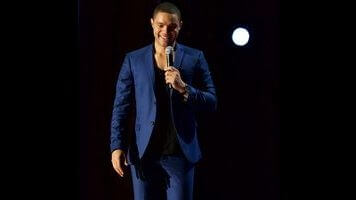Trevor Noah was an unexpected but canny choice for Jon Stewart’s replacement on The Daily Show. While he’d been a charismatic presence during appearances in his brief tenure as a correspondent there, his move behind the desk was surprising—he’d only been on the show for four months (and intermittently at that) before being named heir to Stewart’s venerable truth-teller’s throne. But, despite youth, perceived inexperience, and a penchant for regrettably hacky Twitter jokes in his past, the idea had its merits, especially when so much of the news being comically dissected in Stewart’s final months concerned racial tensions in America.
Noah, raised in poverty in Soweto, South Africa (“the home of some of the best racism in the world,” jokes Noah), brought a point of view to The Daily Show that felt necessary, even refreshing. In his correspondent pieces on the show (some of which resurface in Lost In Translation, his first comedy special since taking the Daily Show gig), Noah exhibited an outsider’s bewildered disdain that contrasted nicely with Stewart’s world-weary exasperation at then-current events like police killing unarmed black men in Ferguson, Staten Island, North Charleston, and a deadeningly long list of other places. For those who looked to The Daily Show as a voice of reason in a time of entrenched racial attitudes and sub-high-school-debate public discourse on the airwaves, the confident, cutting young South African promised a shot of new, desperately needed perspective.
In Lost In Translation, Noah performs to a large Washington D.C. crowd that’s clearly ready to welcome him. Apart from the extended ovation that greets his entrance and the steady laughter throughout, the crowd frequently breaks into appreciative applause in response to Noah’s political material. It’s a response Noah welcomes as well, at times pausing to wait for and then drink in his audience’s approbation, a self-satisfied confidence not always borne out by his material which, especially in the first half of Lost In Translation, is often more on-point than hilarious in itself.
Noah’s an engaging, charming comedian, his open face and winning smile combining with the musical lilt of his accent to present the persona of an eminently decent and unthreatening figure. Indeed, Noah’s charm is an underlying theme of one of his main bits here, where a story about his first time being pulled over by a white cop in America derives comic tension from the thought that even Trevor Noah—semi-famous, polite, handsome Trevor Noah—could be racially profiled for driving a nice car.
But here, as in another anecdote about being profiled for an entirely different reason (boarding a plane during the Ebola panic), Noah doesn’t have a firm handle on his storytelling. In both bits, he escalates the absurdity of the situation without establishing a baseline of reality, so that the underlying satirical points are weakened. In both cases, he portrays himself acting in ridiculous ways—literally playing dead in panic when the policeman approaches his car, spitefully defying the airline’s seemingly ludicrous Ebola protocols—which, in Noah’s energetically pleasing delivery, elicit roars of laughter from a crowd swept up in the telling. However, the power of both pieces is diminished because he’s so eager to please that he never establishes storytelling authority: If Noah’s point in each piece is to point out the injustice of his predicaments, the examples he gives come off too elaborately weird to be universal.
In that first half, too, Noah’s more straightforward Daily Show-style material isn’t as well-constructed as it is matter-of-factly targeted to elicit a response. When he does address the events in Ferguson (and elsewhere), his thesis statement, “I don’t know how not to die,” is powerful, and his catalog of the lessons he’s learned (don’t move toward the police, don’t move away from the police, don’t wear hoodies, don’t be a big black guy) underscores the point well. And his unpacking of the way the news delves into black victims’ pasts in order to shift blame does the same. (Speaking of shooting victim Walter Scott’s 1987 assault conviction, he asks with mock incredulity, “How hard did he punch that guy that he got shot in 2015?”) But Noah’s anger isn’t comedically focused enough to tie the material together satisfactorily—and tossing a lame Kardashian joke in the middle of the bit doesn’t help.
Noah is strongest later in the special, when he crafts a pair of extended jokes that have more of an individual voice. In explaining why he chooses to fly to the U.S. on Middle Eastern airlines, he acts out a scene between a would-be suicide bomber and a Muslim passenger with solid character work that builds the premise to a satisfying payoff, while copping to his own innate prejudices at the same time. And, in discussing the differences between the brutal but honest racism he grew up with and the “charming racism” he’s encountered in America, Noah displays some stellar vocal work, turning two Southerners’ dueling directions into a musical argument whose improbable harmony (“It’s like a Mumford & Sons concert in their mouth”) ends in an expertly deployed slur as a capper. A similar story of genteel Southern racism that ends the special cuts out too abruptly, but also shows Noah’s adeptness with character work. That element of his work isn’t in evidence often enough in the early parts of the special, where he adopts the same two “white people” voices too often.
As with his stint on The Daily Show, Trevor Noah in performance is a work in progress. The consistently enjoyable Lost In Translation suffers most from the expectations that come along with Noah’s new gig.









































